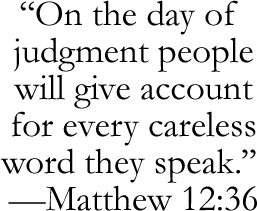In Defense of Clean Speech in Christian Fiction, Part 3
 See Part 1, Part 2, Part 3, Part 4, Part 5, Part 6, Part 7, and Part 8.
See Part 1, Part 2, Part 3, Part 4, Part 5, Part 6, Part 7, and Part 8.
What Is “Clean Speech”?
Before we discuss what unclean speech is, let’s define clean speech based on the ultimate authority: God’s Word.
The Bible is jam-packed with great verses about communication that would merit God’s smile (Ps. 19:14; Prov. 15:26; 16:24; Matt. 12:36; Col. 4:6; Titus 2:7-8; ), but I think this verse is probably the best.
Finally, brothers, whatever is true, whatever is honorable, whatever is just, whatever is pure, whatever is lovely, whatever is commendable, if there is any excellence, if there is anything worthy of praise, think about these things. (Phil. 4:8)
In other words, clean thoughts come from clean words. The publication “A Biblical Approach to Objectionable Elements in Christian Education” puts it this way:
This grand prescription for mental, moral, and spiritual health [Phil. 4:8] expresses the principle that dwelling on good will help to drive out evil. The believer’s main subject of meditation should be the Scriptures—for blessing (Ps. 1:2) but also for protection (Prov. 6:20-24).
How “Christian” Are Christian Novels?
This discussion is not about the latest J.K. Rowling novel (which I’ve heard has both content and language issues). We’re talking about “Christian” fiction. Books that so identify with Jesus Christ that the very word Christian (as opposed to secular) determines where they get placed in a Barnes & Noble bookstore.
Frankly, I’m tougher on Christian authors than secular authors in the language department because secular authors don’t know any better. Christian authors do—or they should. If not, hopefully this series will help.
In fact, I would argue that God holds Christian authors to a higher standard. Why is that? Because all believers in Christ are His ambassadors (2 Cor. 5:20). Jesus bought us at a great price, and we no longer belong to ourselves (1 Cor 6:19-20). Our personal agendas, our rationalizations about realism and art, don’t really matter in this discussion. We bear His image—we carry His flag—to a world that may come to their only true understanding of God based on what we write. What a sobering thought!
Some argue that where Christian novels are shelved in a secular bookstore is exactly why the world will never see our books. But is this really true? When my first novel came out, a few friends bought copies for unbelieving family members. The fact is, we Christian authors have no idea who may pick up our novels at garage sales or give them away as gifts to those oppressed by sin and in desperate need of a Savior.
God’s sovereignty is alive and well. He can use our books to touch lives. He can direct His message to the precise person who needs to read it.
So the question then becomes this: are Christian novels really living up to the Christian label? As God’s ambassadors, Christian writers especially bear the incredible responsibility of presenting an accurate picture of who God is—particularly, I would argue, in the language department. So are Christian novelists passing the test?
 Clean Speech as It Relates to the Holiness of God
Clean Speech as It Relates to the Holiness of God
What exactly do I mean by “the holiness of God”? I mean God as distinct (Ex. 15:11), separate (1 Sam. 2:2), and morally pure (Ps. 24:3-5; Isa. 6:3-5; Hab. 1:13). Countless books have been written on the subject, and this small article can hardly do it justice.
Bottom line? If we truly understood God’s holiness and our role as His ambassadors, we—all believers—would be more careful about the words we use to represent Him and His glory to those who desperately need His saving grace. Perhaps you can relate, as I do, to the prophet Isaiah’s response to God’s holiness in Isaiah 6:5.
Woe is me! For I am lost; for I am a man of unclean lips, and I dwell in the midst of a people of unclean lips; for my eyes have seen the King, the Lord of hosts!
Yes, we are all unclean, and we live in an unclean world. That’s why we need Jesus—to clean us up so we can meet God’s holy standard! Consider God’s mandate in 1 Peter 1:14-16:
As obedient children, do not be conformed to the passions of your former ignorance [before you became God’s ambassadors], but as he who called you is holy, you also be holy in all your conduct, since it is written, “You shall be holy, for I am holy.”
What a high standard God has set for us! This holiness—this separation from evil—may seem impossible for us to achieve, yet God promises that we can do all things as He empowers us (Phil. 4:13).
If the goal of our speech is to accurately represent a holy God to those who badly need Him (Matt. 28:19-20), how can we even consider tarnishing that representation with the vulgar, profane language of this unholy world?
To be true to our holy calling, I argue, we cannot. That’s why using unclean speech in a novel bearing the name of Christ should be a crime. We need a revival in the Christian fiction market. We need to return to God’s standard if we have strayed.
Yes, holiness is a high standard I often fail to achieve in my own life. I’m preaching at myself here.
What about you? How have you struggled this past week to portray an accurate reflection of God through the words of your mouth or the attitudes of your heart? If you are a Christian author, do you better understand how your words matter to the One who gave you life and breath?
- In Defense of Clean Speech in Christian Fiction, Part 2
- In Defense of Clean Speech in Christian Fiction, Part 4










Pingback: In Defense of Clean Speech in Christian Fiction, Part 4 - |
Pingback: In Defense of Clean Speech in Christian Fiction, Part 2 - |
Pingback: In Defense of Clean Speech in Christian Fiction, Part 8 - |
Pingback: In Defense of Clean Speech in Christian Fiction, Part 5 - |